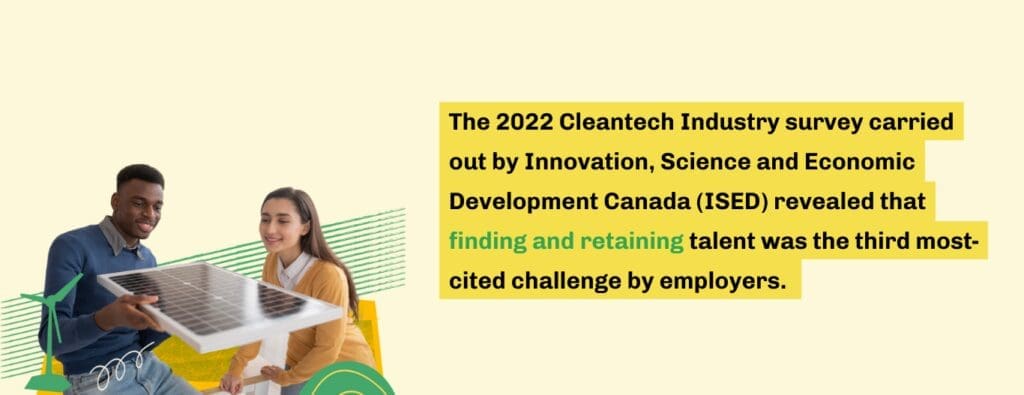Sustainability and your future
Canada’s climate change commitments promise not only a more sustainable future, but also big opportunities when it comes to Canadian careers. In 2020, the federal government announced plans to move to a net-zero economy by 2050, backing up this ambitious target with a comprehensive strategy that includes significant investments in clean technology and other growth sectors that can help achieve critical sustainability goals. To help understand what kinds of career opportunities there are for you in environmental and clean technology (ECT), let’s take a look at what the sector is all about, and what it means for Canada’s future.
It might surprise you to learn that Canada is already recognized as a global cleantech leader, ranking second worldwide in the Global Cleantech Innovation Index for 2024! The ranking owes much to the fact that this country has a proven track record when it comes to producing dynamic startups and commercializing innovative cleantech solutions. So, what exactly is clean technology, and how important is it for the Canadian economy?
Understanding the role of clean technology
The world is starting to shift to cleaner and more sustainable ways of doing things, from using less energy, generating more renewable power, or cutting down on waste. In Canada and around the world, this shift is driving innovation and creating opportunity for an unprecedented era of clean growth.
To understand the implications of cleantech on jobs and the future economy, Palette Skills teamed up with Deloitte. The result is a detailed report that underscores the critical opportunities and challenges for the country, not only in clean technology, but in five other high-growth areas that hold the promise of building both sustainability and rewarding careers.
So what exactly is clean technology? According to Canada’s department of Innovation, Science and Economic Development (ISED), the term clean technology “encompasses any process, product, or service designed with the primary purpose of contributing to remediating or preventing negative environmental impacts through significant energy efficiency improvements, the sustainable use of resources, or environmental protection activities.”
It’s a wide scope of activities that is relevant to many different parts of the economy. From technology that can help decarbonize fossil fuels, minimizing the impact of agricultural waste, or incorporating biofuels into everyday use, cleantech has implications and applications nearly everywhere you can think of.
The cleantech economy and employment growth
Now that we’ve seen how comprehensive clean technology is, it’s easier to understand why it’s already such a significant part of the Canadian economy—and why it’s only projected to become even more important in the near future. In a 2022 study carried out by Export and Development Canada (EDC) looking at both the global and domestic impact of ECT, the agency writes that in 2020 alone, clean technology contributed nearly $10 billion worth of exports.
The Palette-Deloitte report shows that in 2021, the clean technology sector was responsible for generating over $61 billion to Canada’s real GDP and creating an estimated 314,000 jobs. As part of its ambitious strategy, the federal government wants to double the 2020 export value of cleantech products by 2025. If cleantech reaches an annual value of $20 billion in exports, it will become one of Canada’s top five exporting industries.
Just in terms of clean energy jobs—a vital part of clean tech—employment is projected to grow annually 4 per cent between 2020 and 2030. Clean energy jobs are expected to increase the most in Alberta (164 per cent), followed by Saskatchewan (99 per cent), and British Columbia (57 per cent). Not only are these figures significant in their own right, they also show that gains in cleantech are set to outpace anticipated job losses in the fossil fuel sector.
Challenges for cleantech
Robust growth projections mean strong challenges ahead, and it will probably not come as a surprise to learn that finding skilled workers to fuel Canada’s cleantech revolution is one of the biggest. For example, the 2022 Cleantech Industry survey carried out by Innovation, Science and Economic Development Canada (ISED) revealed that finding and retaining talent was the third most-cited challenge by employers. Companies also identified a lack of skills required for critical jobs, in addition to insufficient resources to support training of new employees.
It’s important because, to succeed, the cleantech sector will require investment directed towards upskilling and training of Canadian workers, in addition to building more opportunities for underrepresented communities. Right now, the sector is dominated by men, who make up 64 per cent of environmental and clean technology jobs and own or manage 87 per cent of companies. It’s clear the focus has to be on identifying non-traditional talent pipelines to help make up for the skills shortfall in the sector.
In order to achieve expectations of growth and sustainability, government and industry strategies include driving cleantech adoption through procurement, developing a more agile regulatory system, and expanding skills development. Not only will the workforce need to be equipped for key occupations today, new people have to be recruited to take advantage of the lucrative jobs that are just over the horizon.

Finding your place in Canada’s cleantech future
If you’ve been wondering if there’s a place for you in Canada’s cleantech sector, the answer is a strong yes. Because here’s the thing: employers in clean technology already know that they need many different kinds of skilled workers in diverse roles to ensure continuous growth. In the same 2022 Cleantech Industry Survey referred to before, 69 per cent of cleantech companies were looking to hire applied and technical scientists, including engineers, product designers, chemists to help scale their businesses. More surprisingly, up to 45 per cent of cleantech companies said they need business, finance, and administration professionals. Innovative firms also need data and digital professionals.
The fact is that in addition to people with great STEM (science, technology, engineering and math) backgrounds, the sector needs workers at the production and services level, including skilled workers in trades, drivers, and machine operators. Critically, trade and construction occupations are key for the building infrastructure that will help Canada achieve meaningful decarbonization.
Connect to clean technology with Upskill Canada
Clean technology will enhance Canada’s global competitiveness and economic growth, in addition to helping us reach important decarbonization efforts, reconciliation strategies, and create better employment opportunities in a net-zero economy. It’s one of the reasons why Upskill Canada, powered by Palette Skills has launched several innovative programs designed to connect workers to opportunities in cleantech. Delivered by our ecosystem partners, and designed with top level industry input, connecting with one of our programs could just be the solution to your career, or to meeting your talent needs.
| Occupation Gaps | Top Associated Skills |
| Business and commercial development
specialists |
• Critical Thinking
• Decision Making • Digital Literacy |
| Construction | • Instructing
• Management of Financial Resources • Management of Material Resources |
| Data analyst | • Critical Thinking
• Decision Making • Digital Literacy |
| Digital occupations (e.g., software
engineers, coders) |
• Digital Literacy
• Digital Production • Evaluation |
| Directors, managers, and project
managers |
• Time Management
• Coordinating • Decision Making |
| Drivers | • Operation and Control
• Equipment and Tool Selection • Management of Material Resources |
| Engineers | • Critical Thinking
• Decision Making • Evaluation |
| Mechanics | • Operation Monitoring of Machinery and Equipment
• Preventative Maintenance • Repair |
| Quality/assurance control | • Critical Thinking
• Teamwork • Communication Skills |
| Regulatory specialists | • Equipment and Tool Selection
• Operation and Control • Preventative Maintenance |








